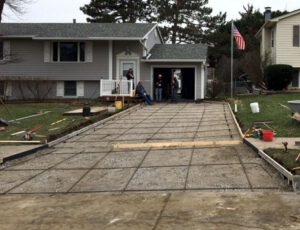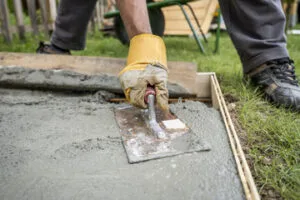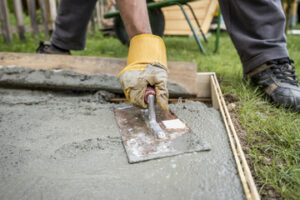Your driveway works hard. It supports your car, takes the weight of snow and rain vehicles, and often doubles as a makeshift basketball court or canvas for your kids’ chalk drawings.
Cracks, potholes, heaving, and discoloration are signs it’s time to replace your driveway. Choosing the right contractor is crucial for getting the most bang for your buck. For professional help, contact Driveway Replacement Colorado Springs.
Over time, the pressures of daily driving wear down your driveway surface. The weight of vehicles, erosion, oil leaks, and general wear can cause cracks, potholes, and a ragged appearance that can diminish your property’s curb appeal.
Replacing your driveway is a chance to refresh its aesthetics and bring new life to the space that greets you and your guests as you arrive at home. From the best material to suit your style to cost-saving tips, a little planning can help you get the most out of your driveway replacement project.
Achieve a sleek and modern look by incorporating simple concrete pavers as your driveway’s surfacing material. Maintaining a minimalist design with these versatile and low-maintenance paving stones allows other components of your front yard landscaping and your home to take center stage.
Planters filled with attractive shrubbery can serve as a great way to add color, texture, and privacy to your driveway. This design also provides a sense of symmetry and balance that will make your home’s exterior stand out and command attention from passersby.
Curb Appeal
The exterior of your home gives visitors and passersby their first impression, and you don’t get a second chance to make it. Upgrading your driveway and walkway can dramatically improve curb appeal. When done properly, it can also increase the resale value.
Whether you are entertaining friends or preparing to sell your home, having an inviting front walk and driveway helps set the tone for the rest of your property. Investing in these hardscape upgrades not only increases your personal pride in your home but may also help you sell it faster and at a higher price.
A concrete driveway that is cracked, stained, and covered in weeds can be eye-catching, but it’s not always the best way to welcome guests. A fresh coat of paint or stain and the removal of weeds can revitalize the look of your concrete driveway. For a more dramatic change, you can replace your driveway with pavers or brick to match the style of your house.
Pavers are a great choice for driveways that are subject to heavy use since they are durable and easy to maintain. They come in a variety of colors and styles, so you’re sure to find one that suits your tastes. You can even choose pavers that mimic the look of natural stone, adding a touch of elegance to your home.
While patching a few severe cracks or pits in your driveway can temporarily restore its appearance, it’s not a long-term solution. In the long run, resurfacing your entire driveway is a better option for both structural rehabilitation and curb appeal.
Often, the driveway and front walk are the only things that people can see when they approach your house. A drab and worn front walk can detract from the overall look of your home, but it’s easy to upgrade. Replacing your walkway with pavers or a colored concrete resurfacer can transform the entryway of your home and boost curb appeal. If you’d like to add a bit of flair, you can even flank the edges of your walkway with a masonry column or statue.
Durability
The driveway is one of the most frequently used parts of a home and can be damaged by vehicles, snowplows, rain, and even pets. Replacing it is a substantial investment, but it can help protect your home and add value. Driveway replacement can be done in various ways, from resurfacing to replacing the entire surface. The best way to determine whether you should repair, resurface, or replace your driveway is to evaluate the type and severity of the damage.
Small cracks and surface damage can be repaired with concrete resurfacing or cold patch asphalt, depending on the material of your driveway. However, cracks that are wider than 1/4 inch should be replaced immediately because the water they collect will freeze and expand as temperatures change, causing further damage to the driveway material. Cracks that are accompanied by sunken areas, standing water, or the washout of soil and sand underneath the driveway indicate a serious problem with the base of your driveway materials and may require complete replacement.
In addition to cracks and potholes, other signs that your driveway is ready for replacement include the presence of ruts or depressions in your driveway. These can be a result of vehicle damage or an underlying issue with the slope or drainage design of your driveway. If these issues aren’t addressed, they can worsen over time and lead to more expensive repairs.
If you’re thinking about repairing, resurfacing, or replacing your driveway, make sure to hire an experienced professional who can work on your specific project. Homeowners should ask for references from previous clients and request photos of completed projects. Additionally, it’s important to choose a contractor who uses high-quality materials that will stand up to the weather and traffic.
Some homeowners prefer to use gravel as a driveway material because it is inexpensive and provides a rustic look that matches the surrounding landscape. Gravel is also good for areas that experience frequent flooding or heavy rainfall because it sinks into the ground and doesn’t pool water like concrete. A concrete driveway is the most durable option and can last 20 or more years, but it will need regular repairs and maintenance.
Cost
While most homeowners want their driveways to last for years, most surfaces aren’t designed to stand up to heavy use forever. Over time, asphalt and concrete deteriorate, leading to cracks, heaving, and spalling that threaten the structural integrity of the entire surface. Often, this is the time to consider replacement instead of repairs.
Homeowners should carefully consider the amount of damage to the driveway and the extent of those problems before making a decision. In general, if the damage is minor, repair may be sufficient and cost less than replacement. However, some repairs may be expensive, especially if the surface is heavily damaged.
A major problem with the surface will drive up the cost of a project, including the cost of repair materials and labor. If the damage is caused by standing water, erosion, or tree roots, it may also be necessary to pay for landscapers to regrade the ground surrounding the driveway and install drainage systems that prevent further problems.
When it comes to repairing or replacing a driveway, the type of material is another important factor in the cost. A paved surface can cost significantly more than gravel or crushed stone, for example. Additionally, a textured or patterned paving material is more expensive than smoother, solid surface options.
The most common repair for driveways is patching small cracks. These cracks are caused by weather and aging and can be repaired with inexpensive crack repair filler bought at a home improvement store. Larger cracks, especially those that are interconnected and cover the majority of the surface area, should be addressed by a professional. This will require more extensive filling and sealing.
Another common issue is the apron, or the portion of the driveway that meets the street. This can be damaged by plows, snow shovels, and vehicle impacts. The apron can be filled and leveled, but this will add to the overall cost of the repair.
Lastly, if the driveway has become sunken and unstable, it will need to be mudjacked. This process involves pumping a mixture of concrete and sand underneath the slab to raise it. This is a more extensive and costly repair than simply resurfacing the surface, and it can cost upwards of $2,300 for a 24’ x 24’ concrete driveway.

